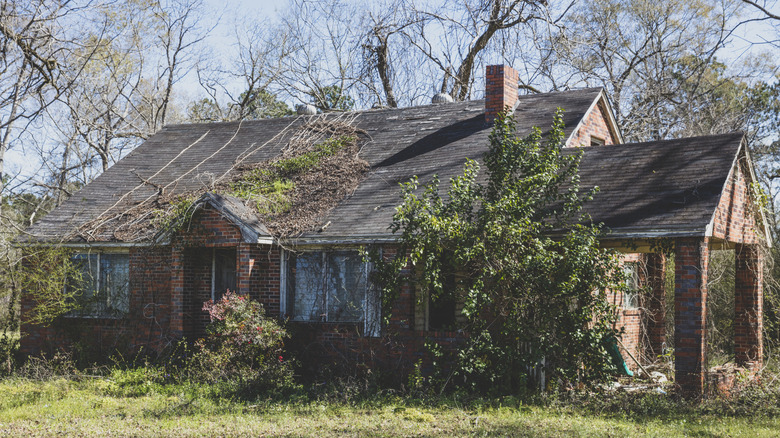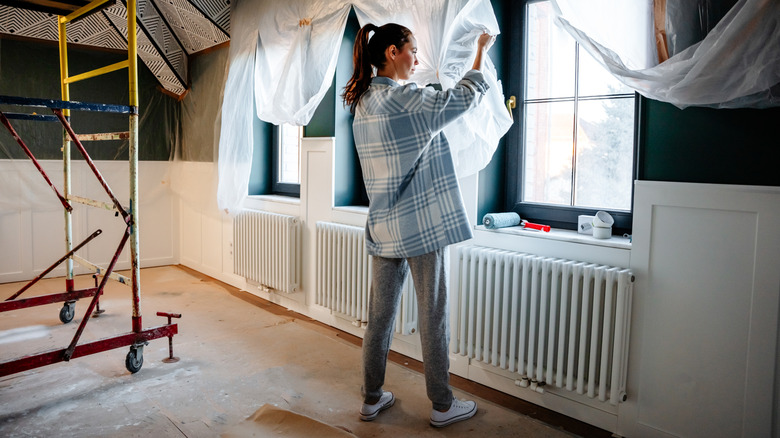Is It Still A Good Investment To Buy A Fixer-Upper Home To Renovate?
The market for fixer-uppers had a good run. For years, bargain-hunting buyers sought out these properties, driven by a combination of affordable housing prices, low interest rates, the DIY craze, and a barrage of home renovation shows that romanticized the idea of transforming a run-down house into a dream home — or flipping it for a quick profit. Recently, however, as the costs involved with these projects have risen, it's become clear that buying a property in need of a major repairs or remodeling may not be such a great investment anymore.
Home purchase and renovation costs have both gone up significantly over the last few years, and mortgage rates have more than doubled since January 2021. Meanwhile, construction materials and labor costs have both been on the rise, in part due to newly implemented import tariffs and the uncertainty surrounding them. The increase in costs across the board has left some buyers questioning whether it makes sense to purchase a fixer-upper in the current climate and if now is the right time to start a home renovation. For many, the answer is no.
First-time buyers face additional challenges with fixer-uppers
Thanks to their budget-friendly price tags, fixer-uppers often fit into the natural home-buying timeline for first time buyers. However, given the recent rise in costs to purchase and renovate, right now is not an ideal time for many of these buyers to take on a major project. After falling to a historic low in 2021, 30-year fixed mortgage rates have jumped to around 7% (according to Freddie Mac), making monthly mortgage payments a lot more expensive for non-cash buyers. This has coincided with higher construction material prices driven by an increase in import costs as well as higher labor prices due to a shortage of skilled workers.
Additionally, paying cash is rarely feasible for first-time buyers who don't have the option of selling an existing property or tapping into home equity. Fixer-uppers can be especially challenging since properties needing significant repairs often don't qualify for traditional mortgages. A "fixer-upper loan" designed to finance the purchase and renovation of a home (such as the FHA 203K loan, a Fannie Mae HomeStyle Renovation loan, or a Freddie Mac CHOICERenovation) may be an alternative. They generally require low down payments and modest credit scores. However, the process for obtaining these loans can be long and complicated, and there are limits on how much can be borrowed, what repairs are eligible, and how long homebuyers have to complete them. In addition, buyers may have to pay a premium for private mortgage insurance, and some require buyers to have a sizeable cash reserve — up to 20% of the loan value.
Fixer-uppers could offer value for DIYers looking for long-term homes
Despite the high costs of buying and renovating, a fixer-upper could still be a worthwhile investment for cash buyers planning to live in the house long-term and do much of the work themselves. Declining demand for fixer-uppers has caused prices to fall. According to real estate website Zillow, fixer-uppers are selling at some of their lowest prices in three years — over 7.3% less than similar homes. Not only are you more likely to find a good deal, but with less competition it's less likely you'll end up in a bidding war. If you can pay cash to avoid higher interest rates and you're able to do some work yourself to cut down on labor costs, a fixer-upper may still present a good long-term opportunity.
If you're considering a fixer-upper — or purchasing any new home for that matter — you'll need to know how to prepare yourself before buying a home. Understanding the full scope of the costs upfront, including those involved with the purchase as well as the repairs, is essential. Paying cash will allow you to save on closing costs and loan interest payments, but if financing is necessary, a mortgage calculator can help you determine the total purchase expenses. It's also critical to have a home inspection to give you a better understanding of what renovations and repairs will be necessary. Additionally, if you're planning to use a contractor to do most of the work, it's a good idea to bring them along to provide a rough estimate of the renovation costs before you commit.


